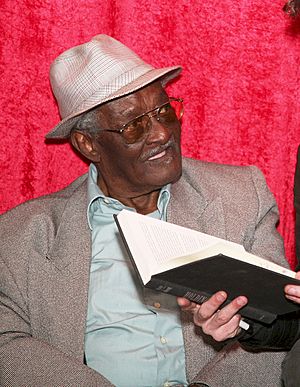Moreese Bickham facts for kids
Quick facts for kids
Moreese Bickham
|
|
|---|---|
 |
|
| Born | June 6, 1917 |
| Died | April 2, 2016 (aged 98) Alameda, California, U.S.
|
| Nationality | American |
| Occupation | Employee of the City of Mandeville, LA |
| Criminal charge(s) | First degree murder of a Sheriff's Deputy |
| Criminal penalty | Capital punishment (commuted); Life in prison (commuted to 75 years) |
Moreese Bickham (born June 6, 1917 – died April 2, 2016) was an American man from Mandeville, Louisiana. He was found guilty of a serious crime in 1958. He was first sentenced to death.
Later, in 1974, his sentence was changed to life in prison. This happened after a big decision by the U.S. Supreme Court. In 1995, the Governor of Louisiana changed his sentence again to 75 years.
Just a few months later, his lawyer helped him get fully released. Moreese Bickham left Angola State Penitentiary in January 1996. He had spent 37 and a half years in prison. He lived the rest of his life in California. He passed away at the age of 98.
Contents
Moreese Bickham's Story: A Legal Journey
Early Life and Military Service
Moreese Bickham was born in 1917. His grandparents had been enslaved. He grew up mostly in Mississippi and Louisiana.
During World War II, he served in the United States Navy. He was stationed at Pearl Harbor.
The 1958 Incident and Trial
In 1958, Bickham lived in Mandeville, Louisiana. This town is north of New Orleans. On July 12, 1958, he was involved in an argument at a bar. Two sheriff's deputies were also there.
Later that night, the deputies went to Bickham's home. There was a confrontation, and Bickham was injured. He was arrested a few hours later.
Prosecutors said that Bickham had planned to harm the deputies. A jury found him guilty of murder. He was sentenced to death by electrocution.
For 14 years, Bickham stayed on death row. He was held in solitary confinement for most of the day. He managed to get his execution delayed seven times.
Sentence Changed to Life in Prison
In 1972, the U.S. Supreme Court made a big decision. They said that some death sentences were not fair. Because of this, many states changed death sentences to life in prison.
In 1974, Moreese Bickham's death sentence was changed. It became life in prison without parole. After this, he was moved into the general prison population.
While in prison, Bickham worked in different jobs. He helped at the visitors' center. He also took care of a garden. He learned how to make things from leather. He even became a minister in the Methodist church.
In 1989, a radio producer named David Isay interviewed Bickham. This was for a documentary about people who had been in prison for a long time.
Working Towards Freedom
In 1994, a lawyer named Michael Alcamo took Bickham's case. He worked for free to help Bickham. Alcamo looked at old trial records and newspaper stories. He believed that Bickham had been wrongly convicted.
Alcamo argued that the deputies' stories had changed. He said there was no good reason for them to go to Bickham's home that night. He suggested that Bickham should have been charged with a lesser crime, like manslaughter. This crime had a shorter maximum sentence. He also argued that Bickham acted in self-defense.
As another option, Alcamo asked for Bickham's sentence to be reduced to 75 years. This would allow Bickham to be considered for parole.
Alcamo started a campaign to get public support. He arranged radio interviews. Bickham was able to speak with his family on the radio for the first time in decades. In January 1995, Louisiana Governor Edwin Edwards agreed to reduce Bickham's sentence to 75 years.
Alcamo then asked for a parole hearing. Even though 37 years had passed, the hearing got a lot of news attention. In April 1995, Bickham's request for parole was denied.
Alcamo then looked at Bickham's prison record. He argued that Bickham had behaved very well in prison. Under Louisiana law, good behavior could reduce a sentence.
The prison warden agreed that Bickham had a good record. Alcamo argued that Bickham should be released based on his good behavior. The Louisiana Department of Corrections agreed.
On January 10, 1996, Moreese Bickham walked out of prison. He was a free man. He was not subject to parole.
Alcamo and David Isay drove Bickham across the state. The next day, Bickham flew to Oakland, California. He was finally reunited with his family.
Moreese Bickham's Legacy
After his release, Moreese Bickham lived in California. He became active in the movement to end the death penalty in the United States.
David Isay, who interviewed Bickham, later created StoryCorps. This is a project that records people's life stories.
Bickham's story has been shared in many national news outlets. These include The New York Times and NPR's Snap Judgment.
A Harvard professor, Dan Gilbert, once quoted Bickham. Upon his release, Bickham said, "I don't have one minute's regret. It was a glorious experience." Professor Gilbert used this quote to show that happiness can be found in any situation.
 | James B. Knighten |
 | Azellia White |
 | Willa Brown |

